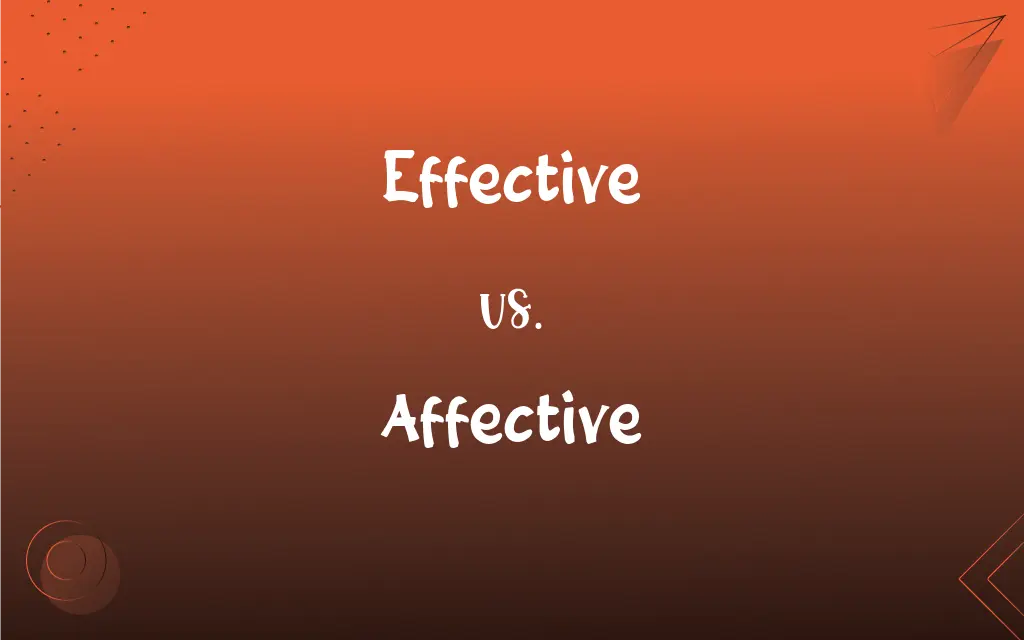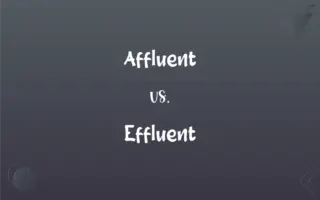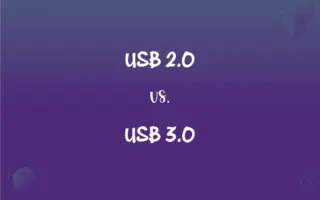Effective vs. Affective: What's the Difference?
Edited by Aimie Carlson || By Harlon Moss || Updated on October 23, 2023
Effective relates to producing a desired outcome; affective pertains to emotions or moods.

Key Differences
Effective typically denotes the capability of producing a desired result. For example, an "effective method" is one that works well. On the other hand, affective is a term most commonly related to feelings, moods, and emotions. This distinction can often be seen in the fields of psychology and education.
In a workplace context, an "effective leader" would be one who accomplishes organizational goals efficiently. Conversely, an "affective response" would indicate an emotional reaction, possibly to the leader's style or decisions.
When talking about communication, being "effective" means that the information was conveyed clearly and understood by the recipient. If someone mentions "affective communication," they are likely referencing the emotional tone or impact of the message.
Effective can also be used to describe tools, methods, or strategies that are successful in accomplishing a task. For example, an "effective tool" accomplishes its job well. Affective, in contrast, would describe the emotional or mood-related aspects, such as an "affective reaction" to using that tool.
In medicine, an "effective treatment" is one that alleviates symptoms or cures a condition. If a patient has an "affective disorder," it refers to a set of conditions related to mood disturbances, like depression or bipolar disorder.
ADVERTISEMENT
Comparison Chart
Definition
Producing a desired result
Relating to moods or emotions
Context Usage
Tasks, strategies, methods
Reactions, feelings, disorders
Example Phrases
Effective solution
Affective response
Fields of Relevance
Business, medicine
Psychology, emotional studies
Sentence Usage
The method was effective
Her reaction was deeply affective
ADVERTISEMENT
Effective and Affective Definitions
Effective
Active and operational.
The law becomes effective next month.
Affective
Relating to moods, feelings, and attitudes.
The movie had a strong affective impact on the audience.
Effective
Efficient in producing a result.
Her teaching style is effective.
Affective
Influencing the emotions.
Music can be a deeply affective medium.
Effective
Impressive or striking.
His speech was powerfully effective.
Affective
Associated with emotional response.
The artwork elicited an affective reaction.
Effective
Adequate to accomplish a purpose.
The medicine was effective in treating the symptoms.
Affective
Concerning the emotions.
Her gesture was affective and heartfelt.
Effective
Producing desired results.
The strategy was highly effective.
Affective
Of or relating to affectivity.
He suffers from an affective disorder.
Effective
Having an intended or expected effect.
Affective
Influenced by or resulting from the emotions
Affective gestures and facial expressions.
FAQs
What does "effective" generally mean?
Effective means producing a desired or intended result.
Can "effective" relate to efficiency?
Yes, something effective often operates with efficiency.
Can tools be described as effective?
Yes, if they perform their function well.
Is effectiveness measurable?
Often, yes. It can be gauged by results or outcomes.
Can music elicit an affective response?
Yes, music can evoke strong emotional reactions.
Is there a connection between "effective" and "efficacy"?
Yes, both relate to the ability to produce desired outcomes.
Can a medicine be described as effective?
Yes, if it successfully treats a condition.
How does "affective" relate to "affect"?
"Affective" is the adjective form, while "affect" is a noun (emotion) or verb (to influence emotionally).
How is "affective" primarily used?
Affective pertains to emotions, moods, or feelings.
Can a person be described as effective?
Yes, if they accomplish tasks or goals successfully.
What’s an antonym for effective?
Ineffective.
Are "affective disorders" related to mood?
Yes, they are conditions like depression or bipolar disorder.
How can I use "effective" in a business context?
"We need an effective strategy to boost sales."
What's an example of an "affective experience"?
Watching a tear-jerking movie.
Is "affective" only used in psychology?
Mostly, but it's also used in general contexts to describe emotional reactions.
Can a mood be described as affective?
Yes, especially when emphasizing its emotional quality.
Is "effective" always positive?
Mostly, but context matters. A poison can be "effective" but negative.
Is "affective" the same as "affectionate"?
No, "affective" relates to emotions; "affectionate" means showing affection.
Can art be described as affective?
Absolutely, if it evokes strong emotions.
Are affective reactions always emotional?
Yes, they relate to feelings or moods.
About Author
Written by
Harlon MossHarlon is a seasoned quality moderator and accomplished content writer for Difference Wiki. An alumnus of the prestigious University of California, he earned his degree in Computer Science. Leveraging his academic background, Harlon brings a meticulous and informed perspective to his work, ensuring content accuracy and excellence.
Edited by
Aimie CarlsonAimie Carlson, holding a master's degree in English literature, is a fervent English language enthusiast. She lends her writing talents to Difference Wiki, a prominent website that specializes in comparisons, offering readers insightful analyses that both captivate and inform.































































